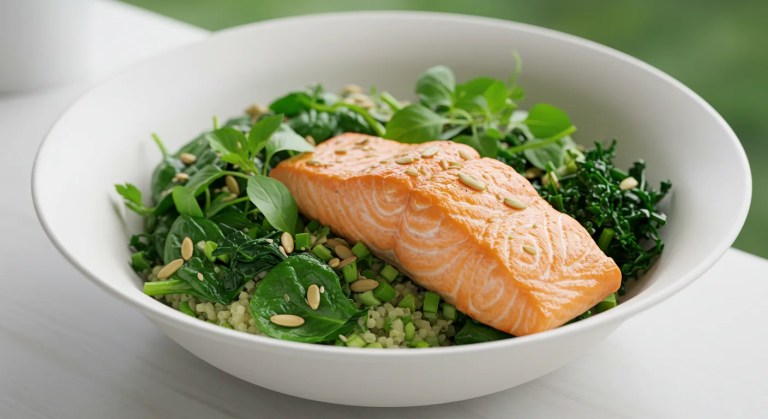Introduction: Why Mindless Eating Keeps You Stuck
Have you ever reached the bottom of a snack bag only to realize you weren’t even hungry? Or finished a meal while scrolling through your phone, barely tasting a single bite? This is the trap of mindless eating, and it’s one of the biggest reasons weight loss feels so frustrating.
Here’s the truth: most people don’t struggle with knowing what to eat—they struggle with how they eat. That’s where mindful eating comes in. Unlike diets that rely on restrictions and rules, mindful eating is about slowing down, noticing your body’s signals, and making food choices with awareness instead of impulse.

And research agrees. Studies show mindful eating helps reduce overeating, emotional eating, and cravings, making it a sustainable tool for weight management. Best of all? You don’t need to count calories or cut out your favorite foods—you just need to pay attention.
Read Also: Early Signs of Iron Deficiency in Women: Symptoms, Causes, and What You Need to Know
What Is Mindful Eating?
Mindful eating is the practice of bringing full, non-judgmental awareness to the experience of eating. Instead of eating on autopilot, you learn to notice:
- When you’re truly hungry vs. emotionally triggered
- How food tastes, smells, and feels
- When your body is satisfied, not stuffed
Think of it as retraining your brain and body to work together—something diet culture often ignores.
How Mindful Eating Aids Weight Loss

Mindful eating supports weight management by focusing on behavior, not restriction. Here’s how it works:
1. Improves Appetite Awareness
- Learn to separate physical hunger (fuel) from emotional hunger (stress, boredom, sadness).
- Pro tip: Many people mistake thirst for hunger—try a glass of water first.
2. Enhances Satiety Signals
- Your brain needs about 20 minutes to register fullness. Eating slowly gives it time to catch up.
- Try smaller bites, chopsticks, or a smaller plate to pace yourself.
3. Reduces Cravings & Emotional Eating
- Instead of fighting cravings, get curious: “What do I really need—food, comfort, or rest?”
- Healthy alternatives: journaling, deep breathing, or a quick walk.
4. Increases Meal Satisfaction
- Savor flavors, textures, and aromas. When food feels like an experience, you need less of it.
- Use the “first-bite rule”—focus fully on the first few bites when flavors are strongest.
How to Start Mindful Eating for Weight Loss
You don’t need to overhaul everything. Start small—practice mindful eating with one meal per day, then expand.
Before You Eat
- Check hunger level: Rate from 1–10 (true hunger vs. emotional trigger).
- Pause with gratitude: Reflect briefly on where your food came from.
While You Eat
- Eliminate distractions: No phone, TV, or laptop.
- Engage all senses: Notice colors, textures, smells, and sounds.
- Eat slowly: Chew each bite 20–30 times.
- Check fullness cues: Stop at “comfortably satisfied.”
After You Eat
- Reflect: Do you feel energized or sluggish?
- Journal briefly: Note what you ate and how it made you feel—patterns emerge over time.
Read Also: How the Soap You Use Could Be Harming Your Skin — And What to Use Instead
Tips for Building Sustainable Mindful Eating Habits
- Start with one mindful meal per day
- Try new foods and notice how your body responds
- Seek support from a dietitian or therapist if emotional eating feels overwhelming
- Be patient—like meditation, mindful eating is a practice. Slip-ups are part of learning.
FAQs About Mindful Eating and Weight Loss

1. Does mindful eating really help with weight loss?
Yes. Research shows it can lower BMI, reduce binge eating, and promote sustainable habits.
2. Do I have to give up my favorite foods?
No! Mindful eating encourages enjoying all foods in moderation. The key is awareness, not restriction.
3. How fast will I see results?
Weight loss varies. Some notice reduced overeating within weeks, while others experience gradual changes over months. The real win is developing a healthier, long-term relationship with food.
4. Is mindful eating good for emotional eaters?
Absolutely. By pausing and exploring emotions, mindful eating helps break the automatic cycle of stress → food → guilt.
Read Also: Understanding the Health Risks of Too Much Cloves: What You Need to Know
Key Takeaway
Mindful eating isn’t about dieting—it’s about reconnecting with your body, enjoying food more, and naturally supporting weight loss. By slowing down, tuning into hunger cues, and practicing presence, you’ll eat less without feeling deprived and finally break free from the cycle of dieting.



